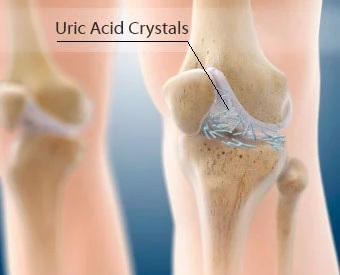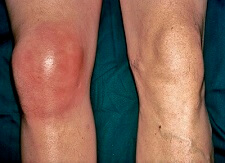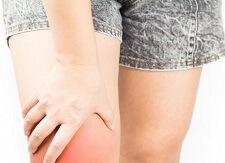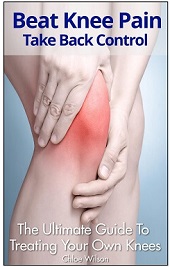Gout Knee Pain:
Your Questions Answered
Written By: Chloe Wilson, BSc(Hons) Physiotherapy
Reviewed by: KPE Medical Review Board

Gout knee pain is a common problem that can be extremely painful and debilitating.
Gout knee symptoms develop suddenly and rapidly and can last anything from a few days to a few weeks. In over 50% of cases, gout knee will strike again within a year.
Here, we look at the most frequently asked questions regarding gout knee pain. If you want more in-depth answers to any of these questions, visit the gout knee guide.
"What Is Gout?"
Gout is a common form of inflammatory arthritis caused by high levels of uric acid in the blood.
Needle-shaped urate crystals form in joints, typically the knee, big toe and hands, causing pain, redness and inflammation.
"What Are The Symptoms Of Gout In Your Knee?"
The most common symptom of gout knee is intense knee pain which typically develops very suddenly and rapidly at night-time.
People suffering from gout often wake up during the night to find their knee swollen, red and hot and painful to walk on.
"How Long Does Gout Last?"
Gout knee symptoms typically settle within a few days, however they may persist for a number of weeks.
When treated, gout knee pain often settles within 3-5 days, but when left untreated, gout typically last 2-4 weeks. Repeat episodes are common
"What Foods Cause Gout Knee Pain?"
There is a strong link between food and gout knee pain. Food rich in purines, found in all foods containing protein, such as offal, oily fish and certain pulses, have long been thought to be linked with gout knee pain
Alcohol and fructose-sweetened drinks, such as beer, fortified wine and sodas, are also thought to increase the risk of developing gout knee as they increase uric acid levels and can also lead to dehydration.
"How Do You Treat Gout In The Knee?"
There are a number of treatment options for gout knee pain:
- Medication: There are various medications that can help reduce gout knee pain. Colchicine helps to reduce urate levels, steroids can help to reduce the pain and swelling associated with gout knee as can over the counter medications such as ibuprofen
- Supplements: There are a huge number of supplements on the market that claim to reduce gout knee pain, often derived from cherries and celery, but you should always check with your doctor before taking any gout supplements. They can be used alongside other treatments but should never replace conventional medicine
- Ice: Regularly applying ice to your knee can help to reduce any swelling and gout knee pain. Ice should be wrapped in a cloth or placed in an ice bag before being applied to the knee, and can be used for up to 15 minutes at a time, regularly during the day
- Rest: Give your knee a break and try and rest when you can to take the pressure off your knee. Keep your leg raised, ideally so your knee is higher than your heart to help reduce any knee swelling
- Fluids: Drink plenty of fluids, preferably water -avoid alcohol and fizzy drinks
"What Foods Get Rid Of Gout?"
There are a number of different foods that are thought to help get rid of gout knee.
- Cherries: There have been a few studies published that suggest cherries can be helpful in treating and preventing gout knee pain. It is thought that the anthocyacins cherries contain help reduce uric acid levels and inflammation. A study published in 2012 showed that gout sufferers who ate at least 10 cherries a day avoided recurrent attacks.
- Dairy Products: Low-fat dairy products such as milk, yogurt and cheese can help to reduce uric acid levels in the blood. It is thought that the combination of being high in protein and low in purine levels is what makes dairy products useful in preventing gout knee pain.
- Coffee: a number of large studies have shown the benefits of drinking coffee, regular or decaffeinated, to prevent gout. One study, looking at over 45,000 people, found that those who drank 4 or 5 cups of coffee a day were 40% less likely to develop gout.
- Water: Keeping well hydrated has also been shown to reduce the risk of recurrent gout attacks as it is linked with lower levels of or hyperuricemia.
- Vitamin C: High doses, 500mg, of vitamin C can help to reduce uric acid levels. Always check with your doctor whether vitamin C could help you before taking it to reduce your gout knee pain
"Can Gout Be Cured Permanently?"
The answer to this is yes and no. Some people are luck to only have one or two episodes of gout that settle quickly with treatment, never to return.
However, in many cases, gout is a long-term condition that needs to be managed, such as asthma or hay fever. Treatment to keep uric acid levels low such as colchicine, and dietary regimes may be necessary long-term to prevent further attacks of gout knee pain.
"What Happens If Gout Goes Untreated?"
If gout isn't treated properly, not only will it take longer to recover from an attack of gout but there is a much greater risk of joint erosion and destruction due to the build up of urate crystals.
There is also greater risk of increased frequency of further episodes of gout without proper treatment for gout knee pain.
"Will Gout Go Away?"
In many cases, gout knee pain will settle down on it's own after a couple of weeks. However, this is not always the case, particularly with recurrent attacks of gout.
Gout symptoms often get progressively worse with repeated episodes. The pain and swelling may be more severe and last longer with each episode of gout knee.
If you have developed trophi, deposits of uric acid crystals, in one or more of your joints, you will notice hard, nodular growths at one or more of your joints. In severe cases, these can cause lasting damage to the joint. But in most cases, with appropriate treatment, the trophi will disappear.
"Can Gout Kill You?"
Whilst the gout knee pain can be absolutely excruciating, gout knee itself can't kill you. It is, however, associated with a number of serious health conditions that can put you at risk of death. Excess uric acid can cause damage to a number of organs such as the heart and kidneys increasing your risk of heart attack, stroke or kidney failure.
When gout knee pain is left untreated, uric acid crystals can form, called trophi, which can cause serious health problems.
But don't panic, as long as gout knee pain is treated properly, there is no risk of death with gout, so always get any suspected case of gout checked out by your doctor asap.
Want To Know More?
There is loads more in-depth information in the gout knee section.
Page Last Updated: 10/01/23
Next Review Due: 10/01/25
Related Articles
References
1. Arthritis & Rheumatism Journal: Cherry Consumption and the Risk of Recurrent Gout Attacks. Y. Zhang, T. Neogi, C. Chen, C. Chaisson, D. Hunter, and H. Cho. December 2012
2. Nutrients Journal: A Review of the Health Benefits of Cherries. D. Kelley, Y. Adkins, and K. Laugero. March 2018
3. American Journal of Lifestyle Medicine: Nonpharmacological Management of Gout and Hyperuricemia: Hints for Better Lifestyle. M. Kakutani-Hatayama, M. Kadoya, H. Okazaki et al. September 2015





